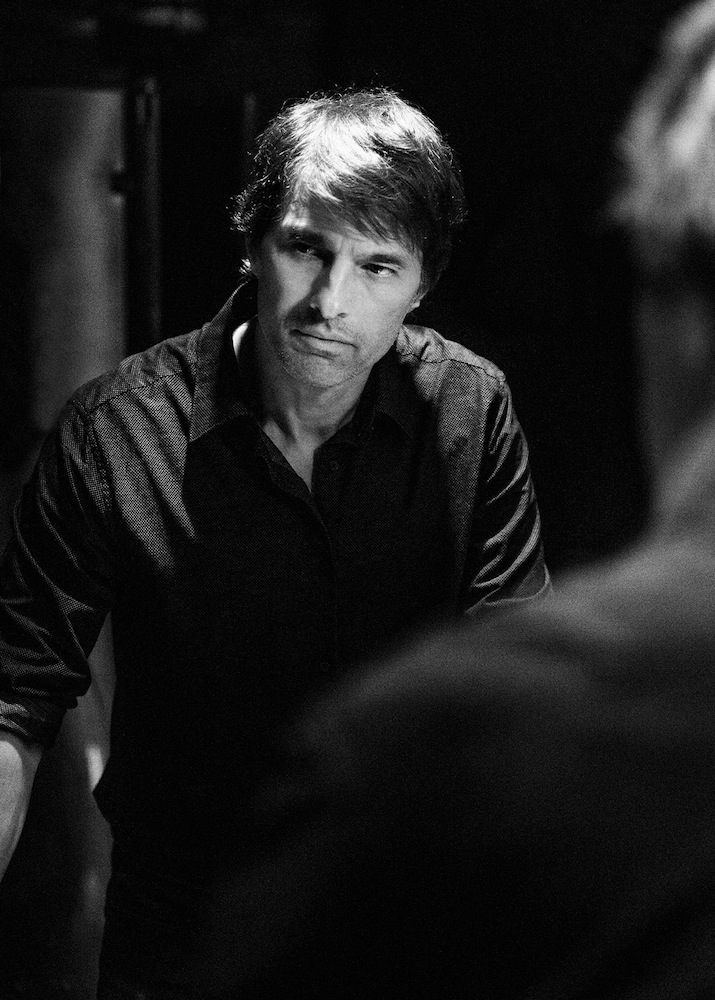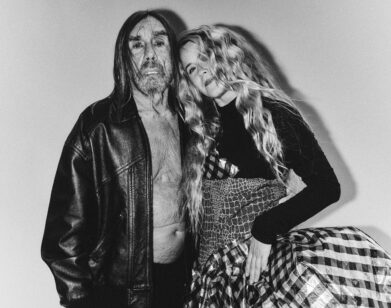The General
OLIVIER MARTINEZ AT AT THE STANDARD, DOWNTOWN LA, MAY 2015. PHOTOS: BRIAN HIGBEE. STYLING: JESSIE COHAN/ATELIER MANAGEMENT. GROOMING: ANNA BERNABE FOR EXCLUSIVE ARTISTS MANAGEMENT USING ARMANI BEAUTY AND KEVIN MURPHY HAIR CARE. FASHION ASSISTANT: VICTOR BROWN.
Texas Rising, the History Channel’s new 10-hour miniseries about the formation of the Texas Rangers, begins with the end of a famous battle. The Mexican army has just won a 13-day siege on the Alamo Mission in Texas, and their commander, General Antonio López de Santa Anna (Olivier Martinez), is watching as male prisoners are lined up in front of a firing squad. Shots are fired, and when one prisoner fails to fall to the ground, Santa Anna finishes him off with a saber.
French actor Olivier Martinez plays Santa Anna, with Bill Paxton as the American hero Sam Houston, and a supporting cast that includes Ray Liotta, Cynthia Addai-Robinson, Brendan Fraser, Thomas Jane, Jeffrey Dean Morgan, and Kris Kristofferson as Andrew Jackson. While the show is based on historical events and figures, it is ultimately fictional. “Even if it’s on the History Channel, it’s not a documentary, so we can have some freedom,” explains Martinez. “If it brings some interest to the movie, it’s welcome,” he continues. “But what is interesting is to not typecast the Mexicans as the typical bad guys, because that would be unfair. It was just a matter of point of view.” The real Santa Anna, who was elected into office in Mexico 11 times, was not as bad as he’s made out to be. “He was not a dictator,” says the French actor. “He has been described like that, but it’s politics. History is something else, and at the time of the Alamo he was not known as a vicious, cruel, tyrant.”
Now 49, Martinez grew up in a working class family with aspirations of becoming a professional boxer. After a car crash, however, he changed tracks and enrolled in France’s foremost drama school, the Conservatoire national supérieur d’art dramatique. Playing Diane Lane’s lover in Unfaithful (2002) made him famous in the U.S., and marrying Halle Berry two years ago turned him into a tabloid fixture, but Martinez had a very successful career in French films long before. He even appeared in Interview‘s July 1992 issue as a face to watch. “My first American interview ever was for Interview for the movie IP5: L’île aux pachyderme by Jean-Jacques Beineix,” he recalls. “I have a special feeling with you guys. You’re my first one, and you only have one first time.”
EMMA BROWN: You were in Interview when Unfaithful was about to come out, and you talked about how you felt less restricted speaking English because you didn’t travel with your culture and your social background. Do you still feel that way?
OLIVIER MARTINEZ: Less. It’s a matter of time; you adapt to the different culture and different way of life. Human beings are adaptable. Before, I was feeling a bit lost. When you’re a foreigner, at the beginning you are far away from the culture. Then, little by little, you start to interact with people, have friends, have a life, and then you feel more comfortable. I feel way more comfortable here than 10 years ago, for sure.
BROWN: Is there any benefit to being a foreigner?
MARTINEZ: It’s a plus if you come on holidays, but it’s not a plus if you are living in the country. I’m always a foreigner here and it’s not the best. I have an accent, I’m limited, I have to play foreign parts—I would love to play American parts but I can’t because I have an accent. You are more limited as a foreigner in every area.
BROWN: I know you have Spanish roots on your dad’s side, and you speak Spanish in Texas Rising, did you speak Spanish growing up?
MARTINEZ: Yes. That’s what I share with the character [Santa Anna]—we both have Spanish roots. But apart from that, we don’t have much in [common]. I’m not Mexican, either. That what’s beautiful with this work—you are able to do things that are far from daily life and that’s what I enjoy. I’m a French actor with Spanish roots born in Paris in a cowboy movie with Bill Paxton, Ray Liotta, et cetera, this is awesome! This is why I love my job. That makes me travel not only in time, but also in space. I was this Mexican general and that’s awesome! If it’s too close for me, it’s not fun.
BROWN: How much did you know about Santa Anna?
MARTINEZ: Before I was part of the project, not much. I knew about the Alamo; even in France, we heard about the Alamo. But I didn’t know much about it, so I did my research. I read historical books; I read interviews, but mostly Mexican historians, because I wanted to know the Mexican point of view about the event. Obviously the Mexican point of view is totally different than the American point of view. In the movie I have this line, “You don’t have good or bad people, you just have winners and losers. And this is war.” So because I was playing the leader of the Mexican side, I had to know about their history from their point of view.
BROWN: How do Mexican historians feel about Santa Anna? Were they more sympathetic towards him or harsher because of his legacy?
MARTINEZ: They don’t like Santa Anna, but not because he was described as vicious or cruel. He was not more vicious or cruel than anyone else. He was not a tyrant, either, because he was elected 11 times democratically. The guy was not fat and old; he was a womanizer, very charismatic, a brave soldier, a bit irrational, not a great sense of politics, but a very good soldier. He’d just liberated Mexico from Spain—he was a national hero at the time. They didn’t like it too much in history because then he became too much and he lost too much territory. Half of America, it’s Mexican territory originally, so that’s pretty impressive—I didn’t know that at all.
BROWN: Do you think it’s fair to call him a dictator then?
MARTINEZ: He was not a dictator. Later on, he was a bit more authoritarian, but Mexico was a democracy and he had been elected democratically 11 times, and that I’m sure about. I’m neither Mexican or American, so it was not emotional for me historically. I’m a little like Switzerland—I’m neutral. I just see the facts; I just see the history.
BROWN: It’s easy to see the ways in which he was not such a nice person, but what are some of his better qualities? What do you admire him for?
MARTINEZ: He was pretty brave. Brave is good—especially when you are a soldier. He lost his leg at the Battle of Veracruz a few years after against the French. They cut his leg off, he went back on his saddle, finished the battle and won. That is the kind of man he was. He was sometimes smart—not always, but sometimes. He was extraordinarily charismatic when he was talking. He was able to put everyone on his side just by talking. That’s why he has was elected so much, because most of the time presidents are elected not by what they do, but on what they say. And he didn’t do much.
At the end of his life, he was invited everywhere in Washington and New York by politicians, the President, business people. He was charismatic even when he was an old man—everyone wanted to have a piece of him. He was like a rock star. So the reality is pretty far from the legend. But I know that because as an actor, I know actors who are nice and sweet in life and have a bad public image, and vice-versa. He was a kind of celebrity at the time and it’s hard to control your image. He was not as bad. He was not as good either, but he was not as bad.
BROWN: Santa Anna has some pretty fun lines in the series—the one you quoted earlier about winners and losers. I like when he’s telling a soldier “Do you know what magnanimous means?”
MARTINEZ: I love it too. I love the moment with Emily West, when he says, “Do you want to be interviewed by me or interviewed by him?” And she says, “By you.” And he says, “Okay, I’ll send for you.” [laughs] When he talks about Texas as hell. He has a great sense of humor in life. He was able to make fun of himself.
BROWN: The chickens…
MARTINEZ: The chickens! I was very happy, because I had a great part. And working with [director] Roland Joffé made it even better. Even if it was a miniseries for TV, for us, the experience we had was to shoot a movie. It was a movie cast, a movie director, sometimes you had six to seven hundred extras.
BROWN: Did you watch movies growing up?
MARTINEZ: Yeah. When I was a kid, I was watching the movies my parents wanted to watch. I came from a working class family, not specifically educated, so we were watching popular movies. My dad liked cowboy movies, so we were watching cowboy movies. Some of them were amazing. It’s a genre of movie I like very much.
BROWN: I know you were discovered in drama school when you were performing a scene in a showcase. Do you remember what the scene was?
MARTINEZ: We had to play a classic scene and a modern scene. The classic scene was the opening of Richard III, and the modern scene was a play written by a very famous French author called [Bernard-Marie] Koltès. It was my second year of dramatic arts school, because the first year you’re not allowed to go. The first year you just study. It’s the best dramatic arts school in France by far, because that’s the one that’s free, and in France, whatever is free is the best. You have 20 people who get in out of six or seven thousand who try to pass the audition. It’s the opposite of America. I could not have afforded to pay for art or acting school. The only way I could have been in an acting school is to try to pass the audition of the best one, and that’s what happened. I got it and I studied and I started to read books and I discovered theater. My first performance was as a stage actor. I was Eben in [Eugene O’Neil’s] Desire Under the Elms. When you play a part like Santa Anna, it’s very much like a Shakespeare character. It has this kind of flavor. He looks like a character from theater.
BROWN: Do you think being a good actor is something you can learn?
MARTINEZ: No. It’s like sports. You don’t teach a guy to run fast. You can teach him to be better with the ball, and he can run faster, but at the beginning he has to run fast. You don’t make a slow guy fast. I think it’s the same in art. Everybody has some talents—we all have an art side and some talent—but you have some areas where you are better than others. My area is acting, I guess. I hope.
BROWN: Have you ever lied about a talent to get a role? I know that you could already horse ride before Texas Rising, but that’s the clichéd example.
MARTINEZ: Yes, I’m sure I have. Not about horses—in any case, they test me first. The stuntman usually bring me to a ranch and I ride a horse. I say, “I want a stallion with balls.” But I’ve lied a lot. When I did my first [English] movie Before Night Falls [2000], sometimes I didn’t understand what Julian Schnabel was saying to me, and I would say, “Yeah, okay! I’m going to do it!” My English was not that good. An actor cannot say no, it’s against his job. If he wants the part he has to say yes. [But] it’s very bad for you to say you can do something and then not do it, so you have to manage to do it.
BROWN: Has that ever happened to you?
MARTINEZ: No, because I’m not stupid. I have enough experience to know [when to lie]. For example, I’ve never studied the art of fencing, but I knew when I did The Horseman on the Roof (1995) that it would not be a problem to learn because I was good in sports. I knew it was about [coordination] of legs and hands, very much like boxing. So I said, “I studied at the conservatory,” when I never went to take a class because I thought I would never be in a pirate movie. It was a lie, I didn’t study it, but because I was a sports guy, I knew I would learn fast and I had time to learn. I don’t do it in the moment, but I have time to learn it and I know I will. It would be very bad for me if it turns out I cannot do it.
TEXAS RISING BEGINS THIS MONDAY, MAY 25, ON THE HISTORY CHANNEL.







